5 years of Covid-19 - The last post
Friday, March 21, 2025
 I have decided to suspend this thread as Covid-19 seems to have largely dropped out of our consciousness. So, this will be the last post. I have decided to suspend this thread as Covid-19 seems to have largely dropped out of our consciousness. So, this will be the last post.
Appropriately, it's the fifth anniversary of the first Covid-19 lockdowns, so maybe that's an appropriate point to finish on.
Image of the Coronavirus [Source unknown]
Preamble
 The first European countries to lock down, shut their borders, stop ferries and ground flights were Italy and Spain, the two countries expected to be most at threat. The first European countries to lock down, shut their borders, stop ferries and ground flights were Italy and Spain, the two countries expected to be most at threat.
Other governments delayed slightly, eg France and Germany, and the UK by a catastrophic two weeks.
[Photo courtesy of Ipsos]
And how did it all turn out?
The decisive and draconian lockdowns in Italy and Spain saved many thousands of lives.
 The reckless delay by the UK - Boris "Bojo The Clown" Johnson, the prime minister, maintaining there was little or no threat for two weeks and allowing major sports events to go ahead - led to many thousands of unnecessary deaths. The reckless delay by the UK - Boris "Bojo The Clown" Johnson, the prime minister, maintaining there was little or no threat for two weeks and allowing major sports events to go ahead - led to many thousands of unnecessary deaths.
Other nonsensical measures, eg shutting pubs and restaurants completely; shutting down live theatre throughout the country; closing museums and art galleries; curtailing public transport, eg buses, trams, trains and underground services; schools were closed; and banning funerals were out of all proportion and the repercussions are still being felt.
Bojo the Clown [Facebook]

Government ministers of the time are still being investigated for ignoring medical and civil service advice; and for corruption.
The partying in Parliament and at Number 10 ultimately led to Bojo's downfall.
Ongoing investigations into Matt Hancock for incompetence and corruption and carrying on an affair;
and special adviser Dominic Cummings, who broke travel rules with impunity, illustrate the hypocrisy of our leaders at that critical time.
Hancock caught in the act [The Sun]
The lies and cover-ups by politicians are an absolute disgrace.
Spain
In Spain where I lived then, and still do, the lockdowns were brutal and policed by all three police forces.
Some say now that what prime minister 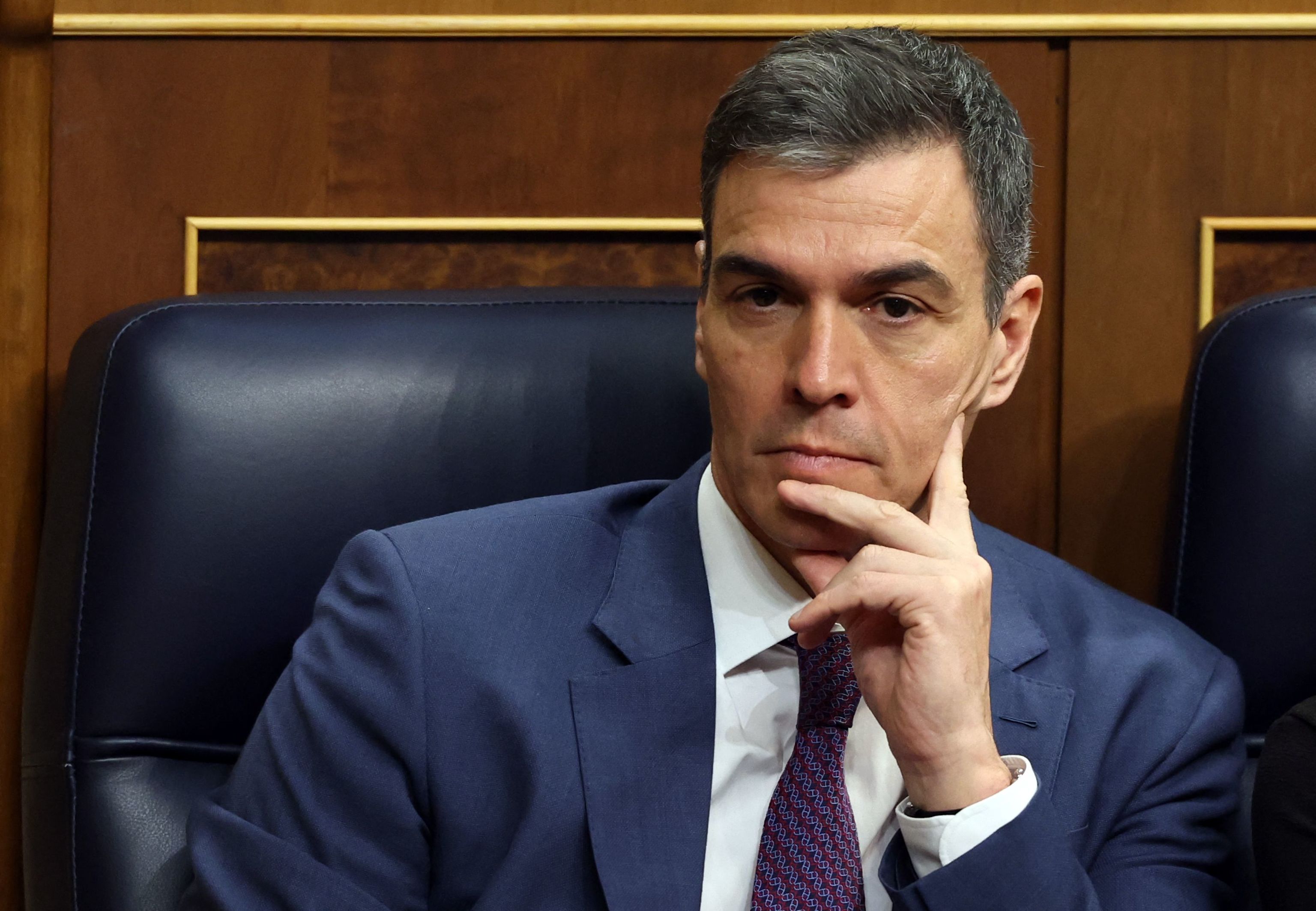 did was over-the-top and even illegal. Illegal or not, that man saved thousands of lives. did was over-the-top and even illegal. Illegal or not, that man saved thousands of lives.
Under lockdown you had to stay at home. You were not allowed to leave your municipality. Hard for flat dwellers; not so bad for people like me who lived in fincas with land in the countryside.
One member of a household only was permitted to shop for food, medicines, tobacco (Doh!), and fuel, and visit the doctor or hospital emergency departments. Nothing else.
Pedro Sanchez [Photo by El Mundo]
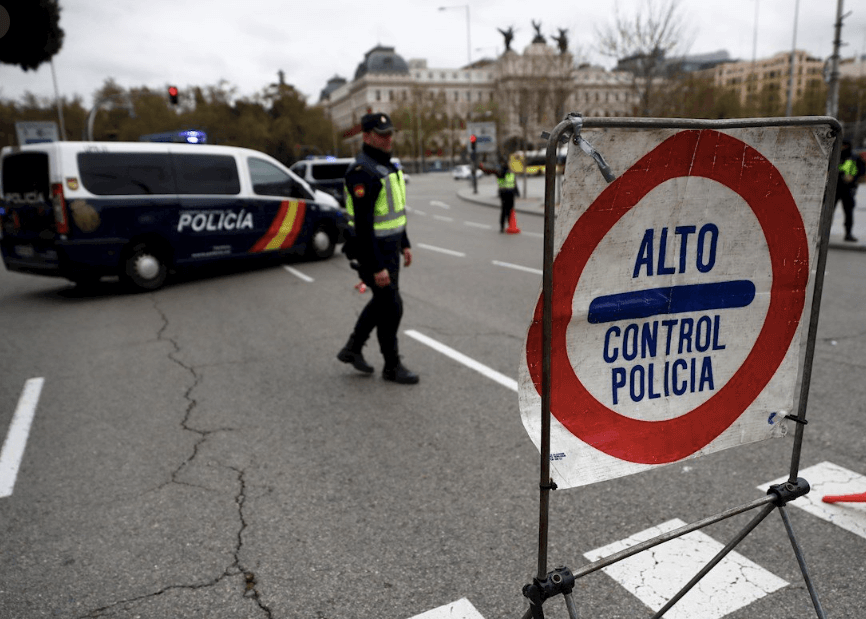 As my house has a Ronda postcode, I was permitted to drive alone to Ronda for any of the above. I was stopped every time I went and quizzed about my reasons for wishing to go into the centre. I told them I was planning to do several permitted activities. As my house has a Ronda postcode, I was permitted to drive alone to Ronda for any of the above. I was stopped every time I went and quizzed about my reasons for wishing to go into the centre. I told them I was planning to do several permitted activities.
"Make sure you keep your receipts, then, because we'll be checking you on the way back out."
Covid-19 road block [Spain in English]
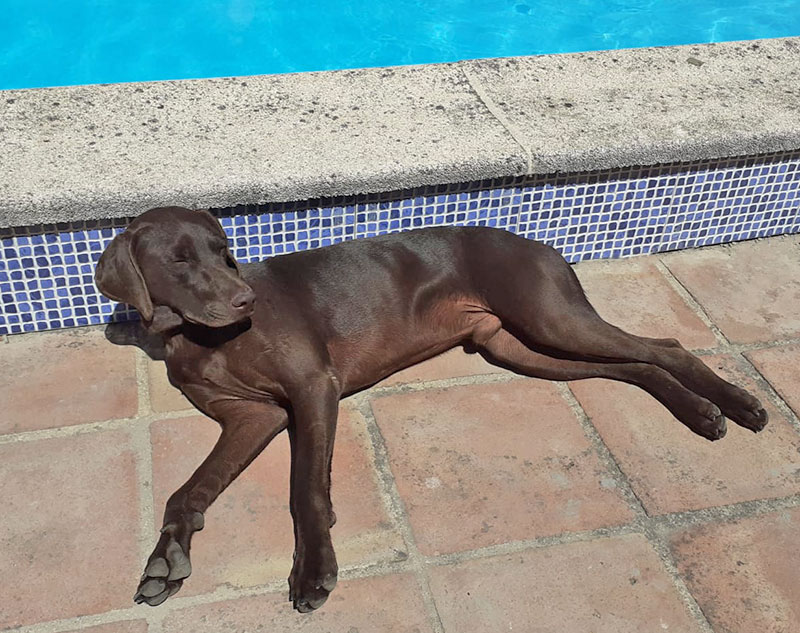 If you had a dog, you were allowed to take it for a short walk. Not a problem for me. My dog Bertie had a huge garden to go at. If you had a dog, you were allowed to take it for a short walk. Not a problem for me. My dog Bertie had a huge garden to go at.
My gardener was not allowed to come to work, so I gradually got stuck in and did the work he would normally have done for me. Mowing lawns, weeding, pruning, and repairing and restoring garden furniture.
When the lockdown requirements eased somewhat, you could sit outside a café in groups of no more than four; you could go to exhibitions wearing a mask; theatres and concerts started up again, whereby you had to leave a metre gap between you and others and keep your mask on.
Berti sunbathing by the pool [Paul Whitelock]
For more on Berti, click here:
One man and his rescue dog... Berti gets a Last Chance - Secret Serrania de Ronda
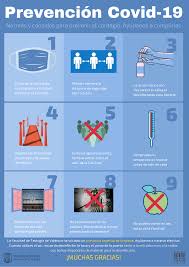 People heeded the rules about not greeting each other with an embrace or a handshake. We learned to touch elbows or knuckles. We were taught how to wash our hands correctly. Even the many men that never used to wash their hands after going to the toilet started to do so religiously. People largely did what they were told. People heeded the rules about not greeting each other with an embrace or a handshake. We learned to touch elbows or knuckles. We were taught how to wash our hands correctly. Even the many men that never used to wash their hands after going to the toilet started to do so religiously. People largely did what they were told.
Alas, it didn't last. When I go to the bathroom nowadays, I'm about the only man who washes his hands.
When vaccines were approved and made available free, most people went for them. I've had all five that I have been entitled to up to now.
[Facultad de Tecnologia Valencia]
In countries like Germany, there are too many "bolshie" people, refuseniks and others who opt not to claim their vaccinations. There are a few in my extended family, I am surprised to learn. What is the matter with these people?
So, five years on, as we count the cost - failed businesses; bars and restaurants that have gone under; a huge increase in cases of mental illness; increased suicide amongst young men; anxious children who have lost at least a year of schooling; post-Covid issues including memory loss, agoraphobia, breathing difficulties and loss of balance - I am left wondering how much worse it could have been.
Endword
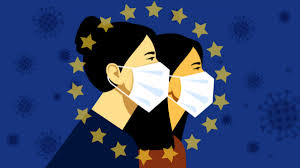 Should you contract Covid-19, keep away from others and wear a mask until your symptoms have disappeared. Should you contract Covid-19, keep away from others and wear a mask until your symptoms have disappeared.
Keep healthy!
[Image by Bruegel]
© Paul Whitelock
Photos and Images:
Bruegel, El Mundo, Facebook, Facultad de Tecnologia Valencia, Ipsos, Paul Whitelock, Spain in English, The Sun
Tags:
agoraphobia, anxious children, banning funerals, bars and restaurants that have gone under, Bertie, Berti sunbathing, "Bojo The Clown", "bolshie" people, Boris Johnson, breathing difficulties, broke travel rules, Bruegel, buses, carrying on an affair, cases of mental illness, closing museums and art galleries, concerts, Coronavirus, corruption, Covid-19, Covid-19 road block, curtailing public transport, dog, Dominic Cummings, El Mundo, Facebook, Facultad de Tecnologia Valencia, failed businesses, fifth anniverary of the first Covid-19 lockdowns, fincas with land in the countryside, five years on, France, fuel, Germany, go to exhibitions wearing a mask, ground flights, hospital emergency department, how to wash our hands correctly, hypocrisy, ignoring medical and civil service advice, illegal, incompetence, I'm about the only man who washes his hands, Ipsos, Italy, it didn't last, I was permitted to drive alone to Ronda, I was stopped every time, keep away from others, keep your mask on, keep your receipts, last post, lies and cover-ups by politicians, lockdown, loss of balance, lost a year of schooling, Matt Hancock, medicines, memory loss, metre gap, mowing lawns, my gardener was not allowed to come to work, not allowed to leave your municipality, one member of a household, over-the-top, partying in Parliament and at Number 10, Paul Whitelock, people did what they were told, people heeded the rules, policed by all three police forces, post-Covid syndrome, prime minister, pruning, refuseniks, repairing, repercussions are still being felt, restoring garden furniture, Ronda postcode, saved thousands of lives, schools were closed, Secret Serrania, shop for food, short walk, shut their borders, shutting down live theatre, shutting pubs and restaurants, sit outside a café in groups of no more than four, Spain, Spain in English, stay at home, stop ferries, suicide amongst young men, theatres, The Sun, thousands of unnecessary deaths, tobacco, touch elbows or knuckles, trains, trams, underground, UK, vaccines, visit the doctor, wear a mask, we count the cost, weeding
 0
Like
Published at 8:07 PM Comments (0)
0
Like
Published at 8:07 PM Comments (0)
Covid-19 is a thing of the past – or is it?
Sunday, August 20, 2023
 As scientists warn of a new mutation of the Coronavirus, in the post-lockdown world, where the vaccination programme appears to have brought the worst effects of the virus under control, are there any positives coming out of the pandemic? As scientists warn of a new mutation of the Coronavirus, in the post-lockdown world, where the vaccination programme appears to have brought the worst effects of the virus under control, are there any positives coming out of the pandemic?
Paul Whitelock and his wife Rita caught the virus in January 2021, and suffered quite badly. There were no injections back then. Paul stood and watched as his wife nearly perished at the hands of the Spanish Health Service, who didn’t know what they were doing two and a half years ago. They had to send her to Germany, the country of her birth, for months, in order to get her well.
Two and a half years later
Both have been left with post-Covid issues, but at least they are alive and grateful for that.
But are there any positives about the worst pandemic to hit the world since the flu epidemic of 1918?
Definitely:
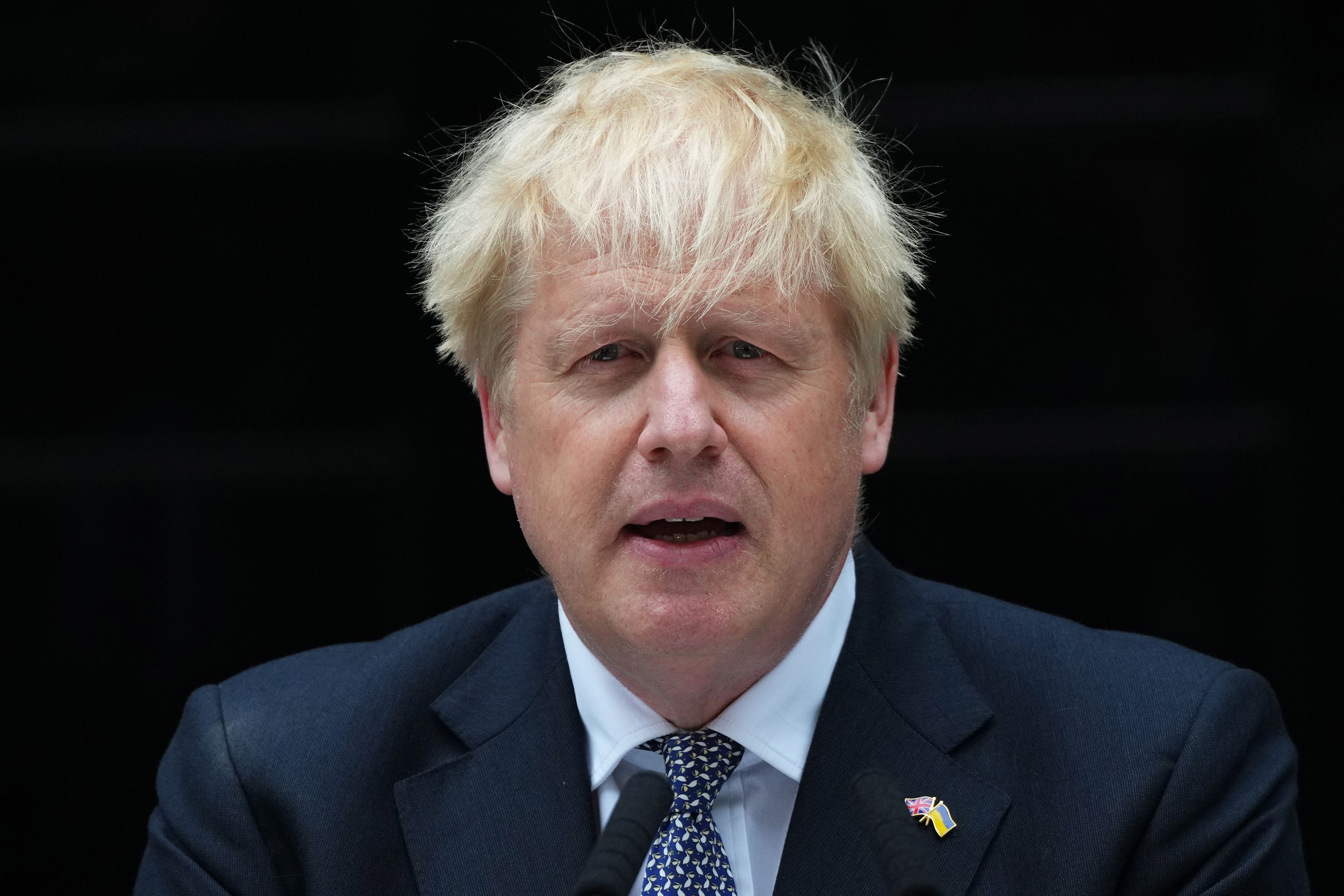
1. Covid-19 ultimately did for BoJo, Boris Johnson, the disgraced former prime minister of the UK who thought it was OK to break his own rules. The country is unlikely to see a worse leader ever. For this writer at least, a massive positive.
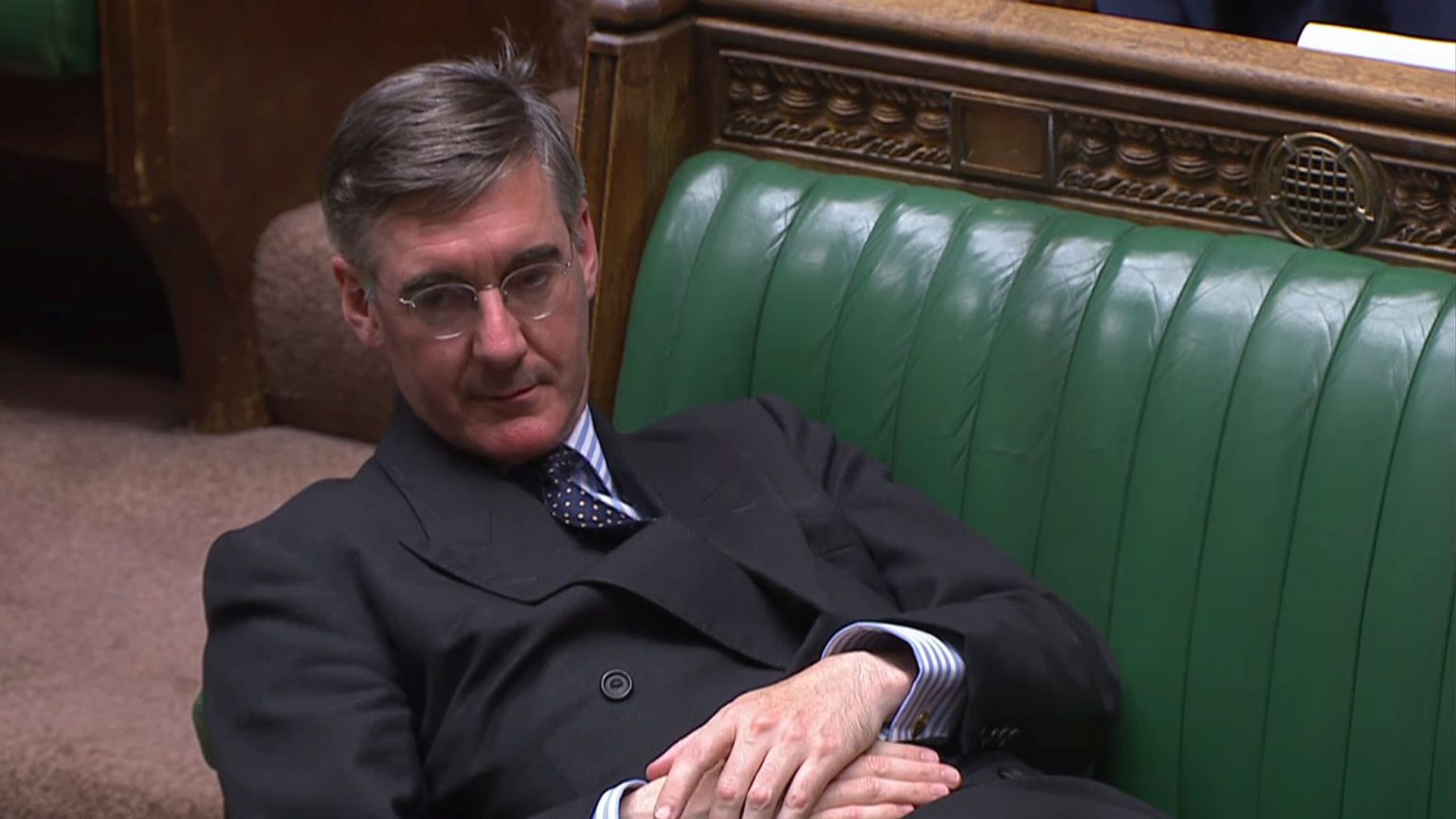
2. Covid-19 revolutionised work practices when the government insisted that people not in the front line had to work from home. Now the same politicians, eg Jacob Rees-Mogg, want everybody back in the office. Thankfully, many are resisting this, as they think they are more productive, waste less time and money on commuting and some companies are saving money by shedding or cutting back on their expensive office space. Working from home is another huge positive.
3. Being sick with the  Coronavirus or losing family members made many people take stock of their lives and adopt a different outlook. Definitely a positive. Coronavirus or losing family members made many people take stock of their lives and adopt a different outlook. Definitely a positive.
4. For a while the Coronavirus caused us to improve our hygiene, particularly hand-washing. I fear people have become complacent and have backslid. I am astonished at the number of men who leave public lavatories without washing their shitty mitts. A potential positive missed.
5. On a personal note, Covid “saved my life”. It kicked me out of an eight-year-long depression and got me doing things again. The greatest positive of all.
So, we don’t know what the future holds, but I fear as a people, we have gotten complacent rather too quickly.
© Paul Whitelock
Tags: BoJo, Boris Johnson, Coronavirus, Covid-19, handwashing, hygiene, Jacob Rees-Mogg, lockdown, Pablo de Ronda, pandemic, post-lockdown, vaccination
 2
Like
Published at 8:05 PM Comments (2)
2
Like
Published at 8:05 PM Comments (2)
Is the Covid Crisis Over?
Friday, November 18, 2022
By Pablo de Ronda
You could be forgiven for thinking so, couldn’t you? Masks no longer a requirement (except in medical settings and on public transport), relaxed rules on social distancing and meeting up, no controls at many country borders and tourism and hostelería booming again.
But is it right that this is now the case?
The economy v. health and safety
Most governments (especially in Europe) have taken political decisions to shore up and revive their economies after two years of blight, perhaps at the expense of people’s lives and welfare.Citizens are still dying of the Coronavirus, although that no longer seems to hit the headlines.
Quarantine
And what ever happened to quarantine? Has that gone back to being only for animals?
The other day in our village we were in the square along with several other foreigners. At a café table sat a German lady, a regular visitor to the village, wearing a mask. “No need to wear a mask any longer,” I pointed out.
“I’ve tested positive for Covid,” came the reply, “I thought I’d better wear a mask.”
“Better that you stay at home,” I thought, but didn’t say out loud. Nor did anyone else, although it later came out that everybody present was outraged. Why did nobody say anything?
This lady is a mature, intelligent, professional person. A graduate and an upstanding citizen. She is also very wealthy, superior in her attitude and somewhat condescending, which was probably why nobody said anything, for fear of being talked down to.
I now regret that I didn’t express my concern at her presence in a public place!
What the hell was she playing at?
The post-Covid future
I hope, as a world society, we do not come to regret the speed with which we've gone back to "normal". Only time will tell.
© Paul Whitelock
Tags: Covid, Coronavirus, mask, quarantine, economy, health and safety, social distancing, tourism, hostelería
 0
Like
Published at 4:56 AM Comments (0)
0
Like
Published at 4:56 AM Comments (0)
First Flight Post-Covid
Sunday, November 14, 2021
Since February 2020 Pablo de Ronda had not stepped onto an aeroplane. He wasn’t convinced it was safe to do so, despite the public protestations by airline chiefs like Ryanair’s Michael O’Leary. However, at the end of October 2021, he has just taken his first flight in 20 months. Here are his observations…
First of all, it was not certain that I’d be able to fly. Five days prior to takeoff I had no passport!
Mine had expired and my new one had not arrived. What to do?
I went online and applied for an Emergency Travel Document (ETD). They only need 48 hours’ notice. It’s for one return journey only and costs a mouthwatering £100.
I collected my very pretty sky blue ETD from the British Consulate in Malaga the day before I was due to travel. Phew!
Departure Day
Malaga Airport was way too crowded for my liking. True, everyone was wearing a mask, as we are required to do, but very few seemed to notice the red circular markings on the floor instructing us to keep 1.5 metres apart.
Security was quite orderly as we passed our belongings through the x-ray machines, but once we got to the gate, yet again nobody seemed to think social distancing was important.
At the gate I offered my TIE as ID which the ground hostess said was fine, but could she please see my passport also. I presented my sky blue emergency travel document and asked her what the current regulations were. She said TIE’s were perfectly fine but she always asked to see the passport anyway. Hmm!
Once we boarded the plane, it was just like the old days pre-pandemic; a veritable scrum!
I was somewhat taken aback that the Boeing 737 was virtually fully booked with 180 of 189 available seats taken.
I’d assumed that middle seats would be left free to keep strangers apart.
What with having to breathe recycled air as well, it’s a wonder anyone survives a journey by air without catching the Coronavirus!
Maybe we were all double-jabbed? Although I doubt it. There are no checks when you book online and nobody ground or airside asked to see our vaccination certificates.
During the flight there were a few Covid-19 protocols in place, eg seat belt signs remained on throughout and you could only purchase things by card, but there were no gels or disinfectant wipes available.
When we landed in Germany there was the same chaos as always as we disembarked the plane and walked to the terminal building to pass through border control and to collect our luggage.
As we entered the baggage reclaim area, the border police were randomly checking ID cards and passports. I was selected to identify myself. I asked the nice policewoman if my TIE would do and she said Ja. I couldn’t lay my hand on it quickly so I proffered my sky-blue (yes, skyblue!) ETD (Emergency Travel Document).
She wasn’t impressed! She took me into a side room. Uh, oh! I thought.
But I needn’t have worried. She’d never seen a sky blue British ETD before and wanted to check things out. She looked in her computer, asked me few questions about why I needed such a travel document and quizzed me on my travel plans (the ETD is only valid for one return journey) and that was that! I was good to go.
“Don’t you want to check our vaccination certificates before you let us enter Germany?”
“Nein!” was her reply.
Okayyy!
After that we collected our luggage, caught a bus, a train, another train and an S-bahn to our destination. The public transport was crowded but everyone was masked-up, though 1.5 metre gaps to strangers were impossible to maintain.
To observe the way the Germans are currently dealing with Covid-19 was interesting.
Very few wear a mask on the street but they do so in shops, bars, cafes and restaurants and on public transport.
You have to show a vaccination certificate, or proof of having had Covid-19 or an up-to-date negative test to do certain things, such as check into an hotel or enter a restaurant. We even had to show our vac certs at a motorway services!
Returning to Spain
The day before departure we completed our locator forms on our mobiles in order to re-enter Spain.
At Karlsruhe/Baden-Baden airport baggage drop they wouldn’t accept my TIE and insisted on seeing my passport. The nice Frau got to see my sky-blue emergency document and we were good to go. She didn’t want to see our vaccination certificates.
The flight back, Ryanair again, was as chaotic as it had been on the outward journey 10 days before.
At Málaga there was a hold-up as they checked our locator forms, but no ID check and no vac cert required.
So, I survived my first flight post-Covid-19. I think …..
We got our flu jabs and pneumonia jabs this week. Our third anti-Covid injection will be within the next two weeks.
 0
Like
Published at 10:51 AM Comments (0)
0
Like
Published at 10:51 AM Comments (0)
Covid-19 Pluses
Saturday, August 14, 2021
There is absolutely no doubt that the Covid-19 pandemic has been a catastrophe of massive proportions.
People have lost lives (4.3 million worldwide), livelihoods, relatives, friends. It has been a complete disaster.
Nevertheless out of bad can come good. Pablo de Ronda feels very strongly about this.
The Covid-19 virus has hit us very badly at a personal level. My wife, Rita, nearly died of it in January, although she is now recovering well after a horrendous four months suffering at the hands of “el bicho”, as the Spanish call this bug.
As for me I have developed long-Covid, which has left my lungs in a very poor state, leaving me breathless after the most minor exertion, eg walking 50 metres. My balance has been affected also and I have constant pins and needles in the fingers and toes of my left side. But, hey, I’m alive!
My pneumologist is doing his best, for which I am extremely grateful.
Pluses
However, as the title of this article implies, there are pluses to Covid-19 for some people, not just manufacturers of face masks and disinfectant gels and online retailers like Amazon.
The main plus for us that we have lurched out of a period of torpor, during which we were doing very little.
Apart from getting back to writing, gardening and DIY, my main loves, I have done a number of things for the first time in my life since the pandemic began in March 2020.
I have built an Arab-style brick column, which my albañil, bricklayer, assumed I got some other professional in to do!
I did an interview in Spanish for local TV and I’ve just had my first ever article in Spanish published in the print media.
I swam in the Mediterranean Sea in December!
I built a car port with friends Kevin and Michael in summer 2020, after lockdown ended.
A few weeks ago I built a child’s swing with José Antonio and Stewart, for my grandchildren to play on when they manage to get over from the UK.
I got my first-ever dog, Berti, in 2020, but he was sadly killed by a hit-and-run driver a few weeks ago.
I successfully grew some “exotic” vegetables for the first time this year, including aubergines, leeks and squashes.
I got a new “job”, at age 71, as an affiliate of estate agency Andalucía Country Houses, which has just opened a new branch in Montejaque, the village near Ronda where I now live.
I bottled olives from my own tree for the first time – about 10 kilos. They taste lovely.
Finally, in April 2021 I bought a VW Camper van. Let’ see if I can persuade the missus to go away in it!
That would be a real plus.
I’ll keep you posted.
 0
Like
Published at 4:53 AM Comments (0)
0
Like
Published at 4:53 AM Comments (0)
Maskerade
Tuesday, August 10, 2021
Some people collect stamps, others beer mats. A friend of mine collects vintage cars and I had a phase some years ago of collecting elephants. Now there is a new trend in town – collecting COVID-19 face masks.
Since Coronavirus turned all our worlds upside down and the wearing of face masks has become compulsory in some countries, like Spain, the manufacturers of mascarillas have been inspired. Shops of all kinds have impressive displays of imaginative masks to suit all tastes and pockets, anything from 2.50€ to 6.99€. One high class ladies’ dress shop in Ronda has masks made of the same material as some of their expensive outfits.
My wife, the Meter Maid (she’s called Rita!), has put together quite a large collection, about twenty. She certainly has a mask for each part of her current wardrobe. And I’ve got together quite a few too, approaching ten. One of my favourites is a grinning clown mask, which invariably gets a laugh when I wear it. I also came across a FC Barcelona mask which I bought straightaway just to annoy my Spanish friends who all support Real Madrid. However, in the interests of fairness I got a Madrid mask too por si acaso. And , to be fair, they did win the Spanish Liga last season.
The best face mask I have had I gave away to my friend Álvaro who owns a hotel, bar and restaurant in Montejaque. I thought I’d be able to get a replacement, but by the following day the shop had sold out and hasn’t had any more of this particular mask since. Doh!
If you want to know what the mask says, visit the bar of the Restaurante Entre Ascuas in the main square in Montejaque, where it adorns the beer tap on the bar.
 0
Like
Published at 4:54 AM Comments (0)
0
Like
Published at 4:54 AM Comments (0)
Getting the Covid-19 Jab
Tuesday, August 10, 2021
While the UK struts its stuff boasting about how many people they have vaccinated (is this the only thing Bojo and his bunch of fellow clowns has got right when it comes to the Coronavirus?), the rest of Europe, including Spain, has been less successful with their vaccination programmes. This has come about because of a mixture of poor organisation, bad procurement and lack of supply. The fiasco of the Astra Zeneca boycott by some countries hasn’t helped either.
How has it been for EyeOnSpain contributor Pablo de Ronda?
Thursday am
My mobile rings
¿Rita Whitelock?
No, soy su marido. Rita es nombre de mujer y yo soy un hombre. Se nota por mi voz.
(Embarrassed cough.)
It was a call to offer my wife Rita a vaccination date.
¿Cuándo?
Mañana a las 12 horas.
Lo siento. Está fuera de España. Vuelve el lunes que viene.
Vale. Llamamos otra vez la semana que viene.
Friday pm
My mobile rings
¿Rita Whitelock?
No, soy su marido. Rita es nombre de mujer y yo soy un hombre. Se nota por mi voz.
(Embarrassed cough.)
It was a call to offer my wife Rita a vaccination date.
¿Cuándo?
Esta tarde a las cuatro.
Lo siento. Está fuera de España. Vuelve el lunes que viene.
I explained that my wife was out of the country until Monday. I also explained to the nice lady about having a similar call yesterday and that I was told they would ring again – next week, not the next day!
She apologised for the confusion and suggested we ring the Centro de Salud ourselves to make an appointment.
OK. We can do that.
Saturday am
Rita is 69, so she is in the cohort being given the Johnson and Johnson version.
I’m 70 and am in a different cohort which is due to be jabbed also in April (it’s already 24th April, by the way, and I haven’t heard a dickie-bird.)
I read in SUR in English that 70 to 79-year-olds are to get the newly approved Janssen drug, which only requires one injection to be fully effective. Suits me.
Then, as soon as possible, I want to get el pasaporte verde to verify my Covid-19 status and let me travel without hassle. Can’t wait – no £100 a night quarantine in a UK hotel necessary then!
Hey, Amy, Carlo, Felix and Jude! And Jeryl! I’m on my way to Bow in the East End of London!
Tom, Su and Wilbur. See you by the sea in St. Leonard’s on Sea!
Simon and Marilyn. Get that double bed in your guest bedroom in South Gloucestershire made up!
 0
Like
Published at 4:40 AM Comments (0)
0
Like
Published at 4:40 AM Comments (0)
Love in the time of Coronavirus
Sunday, August 8, 2021
Pablo de Ronda has fallen in love nine times in the year since March 2020 when the Coronavirus pandemic hit the world with a bang. Here’s what happened to him.
My wife Rita, a German, is fond of saying: “Alle gute Dinge sind drei”, which means “All good things come in threes”.
I can fully endorse this sentiment, as I’ve fallen in love all over again during the time of Coronavirus – literally three times in the last year. With “people”, places and “things”. And each of these, also three times!
Three places
Let’s start with the three places: Spain, Ronda and Montejaque. Although it was love at first site in each case - Spain in 1971, and Ronda and Montejaque in 2000 - I’d sort of fallen out of love with all three during the second decade of the 21st century. Our relationship had become jaded. Spain was too corrupt, too noisy, too bureaucratic, parking was a nightmare, there was litter everywhere and the beer was c**p.
As for Ronda, in addition to the above gripes, the town was too full of tourists from 11.00 am to 4.00 pm, the andaluz accent was getting on my nerves and prices seemed to keep on climbing.
My dream village of Montejaque had lost its erstwhile charm, the steep climb up to Casa Rita, our house there, seemed to get ever more challenging and the guiris had become clique-y. In addition, until fairly recently, there was nowhere decent to eat in the village.
That all changed during the course of 2020, the year the Covid-19 pandemic hit the world with a hell of a bang.
I learned to deal with the issues I had with Spain. The pluses far outweigh the handful of negatives, which will probably never change, so I found ways to not let them bother me too much.
Ronda is of course one of the most stunning towns in the whole of Andalucía, and I began to appreciate once again what it had to offer: scenery, architecture, heritage, cuisine, culture, ambience and friendship. A very comfortable place to be.
Rita and I started spending more time in Montejaque in 2020. We decided to use the lockdown period, when our bookings were cancelled and there were no foreign tourists, to carry out some major renovations to Casa Rita.
We started living in the village again and we re-kindled our erstwhile friendships and made new ones. I got into the habit of going for an early morning coffee in Bar Peruco with the local working men and pensioners, which was immensely enjoyable and hugely informative! [Note: Andrés, the owner of Bar Peruco, sadly died of Covid-19 in early 2021. RIP. A nice man – he is sorely missed. The bar is alas no more as it is being converted into two apartments.]
Using some of the funds from the sale of Piso Blanco, my apartment in Ronda, I bought an old house in Montejaque to renovate and put on the holiday rental market as a vivienda rural. I needed a project to get my teeth into and this was it!
The house will be called Casa Real, in honour of the previous owners who had owned the house for three generations - their surname was/is Real. Although work was paused for three months because of the Covid-19 lockdown rules, work has recommenced. I hope to get it finished, registered and on the rental market this summer.
Three things
The three things I have fallen in love with all over again are, to describe them more accurately, activities. They are gardening, DIY and writing.
I began to garden again during the first lockdown, a year ago. What else was I to do? I couldn’t go anywhere and all you could get on TV was Covid-19 and repeats of old programmes. I enjoyed being out in the fresh air, getting some exercise and seeing the fruits of my labours.
I created some raised beds and planted some vegetables; I pruned the shrubs, bushes and small trees and I’ve had several larger trees severely lopped, which has given parts of the garden light for the first time in a decade or longer. I’ve acquired a lot of plant pots from Facebook Marketplace on the Internet and planted them up with flowers, plants and climbers. In my field next door I’ve planted a dozen or so fruit trees, although yesterday I noticed that the severe frosts we get here in the valley have done a few of them in! That’s a real shame.
Between my gardener, Rafael, my odd-job man, Jorge, and me, we’ve transformed the garden into a place to enjoy.
As for the DIY, as soon we could go shopping again last Spring for paint, tools, materials, etc, I renovated all the garden furniture, both metal and wooden, made a table and sun lounger out of old bits, built a carport with the help of two friends, and created three new patios/terraces with dividing screens for privacy.
Not to mention the work we’ve been doing on Casa Real in Montejaque. Oh, and on Rita’s house, Casa Rita, also in Montejaque.
I’ve found a few things at various rubbish dumps, which I’ve “upcycled”. These include a couple of coffee tables, a set of dining chairs, a beaded curtain, a child’s cot and a large rug – the latter just needed cleaning (with ozonised water, of course).
Partly through all this activity I found I wanted to write again. I approached Karl Smallman of Secret Serranía and offered to turn out some blogs for the website. He was delighted and so was I. Now I can’t stop. There are four blogs in English, namely A View from the Mountains, Living in Spain and Spanish Matters, plus I also contribute to the Recipes blog. In Spanish there are two, Una vista desde la montaña and Recetas. You can check them out by clicking www.secretserrania.com
I’ve also got a couple of books in preparation, on Ronda and on Montejaque. Karl is providing the photographs for both. There will hopefully be versions in English and in Spanish. I’m just looking for a publisher and a sponsor. Any suggestions?
Three people
Firstly I fell in love with Pablo de Ronda, me, again. The Covid-19 lockdown kicked me out of the slough of despond I’d descended into for some years. A period of time when I didn’t really like myself at all.
However, with millions of people dying randomly of this deadly Coronavirus, including local people we know; with my nephew-in-law, the husband of my niece, perishing in a plane crash in Australia; and me and the missus heading for our 70s, I realised how mortal we all are and that we could pass away at any moment.
I decided I needed to make the most of the time I have left on this earth. I needed to be more active, more positive about people and life in general, and more constructive.
I got new specs and some much needed dental work, and I took steps regarding my health (prostate, high blood pressure, a possible melanoma, thickened ankles and, since having Covid-19, breathing difficulties and lack of energy - long-Covid as they call it in the UK.)
I threw myself into various projects, such as upgrading the house and its contents, improving my “wardrobe”, restoring the garden furniture and building a car port with pals Michael and Kevin.
I got a rescue dog, Berti, bought a house to do up in Montejaque, as I mentioned above, and started to write again. I’ve worked hard on the garden and created some new spaces outside. I’ve even started growing things again, planting several fruit trees and sowing vegetables.
I bought a nearly-new Peugeot 2008, sold a pretty old and battered SEAT León and purchased a VW Transporter camper van.
Also, in the course of the last year, I’ve done a number of things I’ve never done before. And there are a few more things I plan to do – a sort of bucket-list.
And in doing all this I’ve begun to enjoy life again and started to like (no, love) myself once more.
The second object of my affection is Berti. It was love at first sight. When we went to see him at his foster home, I fell for him straightaway. He’s not, of course, a person, although he is definitely part of the family.
What a beautiful and good-natured dog. A pedigree, a German pointer, no less. How could his previous owner just dump him at the rubbish tip? Anyway we agreed to take him.
Berti settled in with us straightaway. He has issues, of course, as many rescue dogs have; he suffers from leishmaniosis and he has separation anxiety. We treat his leishmaniosis, a potentially fatal disease rife in Andalucía, with a human gout drug, Alupurinol, and we’re working on his fear of being abandoned - not very successfully, according to our friends.
Sadly, Berti was killed by a hit-and-run driver a month ago. He is sorely missed. RIP Berti.
Finally, I fell in love again with my wife Rita. In January, when the ambulance brought her home after a hellish 10-day stay in hospital with a really bad dose of Covid-19, I thought she was going to die on me. She was really poorly, she’d lost 10 kilos (that’s a kilo a day, by the way!) She had no strength, she was hallucinating, she couldn’t sleep and she had pains throughout her body.
I became her full-time carer. She was so dependent on me for everything. The poor thing couldn’t think straight and she became almost childlike. Actually, I don’t think I fell in love with her again. I simply realised how much I really did love this woman that I bumped into by chance at a fairground in Ronda in September 2008 and married in 2010 at the age of 60.
Rita has been in hospital in Ludwigsburg, Germany, following an operation. She went to the country of her birth to get some decent Covid after-care, not available here in Ronda, and they discovered something else that needed dealing with quickly. We are “grateful” to Covid-19 for bringing about the discovery of this other, potentially deadlier, health issue.
After a further 10 days in hospital recovering from this operation, she is now staying at her daughter’s while she waits for a place on a residential re-habilitation programme. After that a period of convalescence, when I hope to fly over and join her. [Stop press: Rita’s rehabilitation programme has been denied for some inexplicable reason, so plans have been changed. She has gone to her niece in north Germany, who is a physiotherapist, for treatment for a week or so, followed by a bit more convalescence to build up her strength before flying back home to Spain. She is now back. High time; she was in Germany for two and a half months.]
So, Coronavirus has undoubtedly rocked the entire world and has been a terrible thing, causing sadness and grief to many millions of people all over the globe, not to mention suicides, mental health problems, financial ruin and the “lost generation” of students and schoolchildren.
Yet in our case, bizarrely, it has brought a number of positives. No doubt it has to others too.
Apologies to the Colombian writer Gabriel García Márquez (1927-2014) for corrupting the title of his best-known work “Love in the Time of Cholera”, published in 1985, for the title of this article. It just seemed so appropriate to the situation.
 0
Like
Published at 6:34 AM Comments (0)
0
Like
Published at 6:34 AM Comments (0)
Covid-19 is a bastard! Don’t mess with it! A cautionary tale of our times
Sunday, August 8, 2021
This Coronavirus is no joke. Those who deny its existence belong in a looney bin. To date this bug, in just over one year, has killed over 3 million people world-wide, 127,000 in the UK, nearly 77,400 in Spain. Millions have had their health and way of life ruined. Families have been bereaved far too early as formerly strong and healthy young men and women have just crumpled and died. They couldn’t even attend the funerals to say goodbye to their loved ones.
We’ve all been affected in some way whether we live in Hong Kong, New York, London or Madrid or in Ronda, Montejaque, Jimera de Líbar or Serrato.
Many who caught Covid-19 seemed to get off relatively lightly, only to find later that they have developed what the English-speaking world is calling “Long Covid”, in Spanish, “pos-Covid síndrome”.
Pablo de Ronda has seen much of this suffering and death close-up in Montejaque and Ronda (both Málaga province), the area where he has lived for the last dozen years.
He tells the story of one lady’s 2021 so far.
A lady I know in Ronda, a German, who has been resident in the area for 15 years, has had just three healthy days this year and it’s nearly May already. Those three days were 1st, 2nd and 3rd January. On 4th January she began to display symptoms of Covid-19 contagion: bad cough, fever, tiredness, pains throughout her body.
Despite a call on 5th January to the emergency number, 061, the doctor didn’t think she warranted a home visit, nor did she need to attend Urgencias. She also didn’t need to be tested. What?
After repeated calls to 061 and her surgery, Centro Norte de Salud in Ronda, she finally got an appointment for an antigen test and a PCR test on 9th January. She had to struggle to the surgery under her own steam for this, despite being quite poorly by this time.
Not surprisingly she tested positive, but it wasn’t until the evening of the following day that she was admitted to hospital, at the relatively new Hospital de La Serranía on the south side of Ronda.
Admission to hospital proved to be a long and tiring process; long gaps between various tests and hours waiting in a wheelchair on an oxygen drip until a room became available.
The whole thing was compounded by my friend’s poor Spanish (her fault, she freely admits, but nevertheless traumatic in the circumstances).
This lady, from Montejaque’s German twin town Knittlingen, disappeared from view for 10 days. To start with she could communicate with family and friends via WhatsApp or normal mobile phone calls, but she became so unwell and confused that she stopped answering for several days, which concerned everybody.
No information was available about her condition or her reaction to treatment. Her husband rang the hospital umpteen times and nobody could tell him anything, not the nurses, not the admin staff. Only doctors were in a position to give out information about the health of their patients, he was told. There were never any available to come to the phone. After “losing it” a couple of times the husband did eventually get some feedback for the family.
We then began to learn that our patient was being left to her own devices for hours on end. The staff did not respond to the alarm button if she was desperate for a painkiller or needed to visit the bathroom. On two occasions the nurses found her collapsed on the floor of her room, lying in her own excrement.
Later when asked whether she was embarrassed about that, this feisty lady said no – it served them right to have to clean her up, for not responding to her literal calls for help when the alarm button produced no results. Well, I think she certainly has a point!
In the end the family were so distraught at the treatment their loved one wasn’t getting that her husband demanded she be sent home from hospital. He was told that no ambulance was available for patients that self-discharge. You’ll have to book a taxi, they said.
I understand that her husband, also suffering from Covid-19 by the way and quarantined at home, threatened to get in his car, drive to the hospital and collect his wife personally, despite this being a “crime” or “breach of regulations” and subject to a heavy fine.
Guess what? She was transported home to her husband by ambulance the following day. Well done, that man!
Her husband reports that it was like having a “corpse” delivered. This poor lady spent the next 10 days in bed, not sleeping, not eating, not drinking, not doing anything that she knew, as a former nurse, she should be doing to improve her health.
She was hallucinating frequently, probably as a result of the cocktail of drugs they’d been giving her in hospital to ease her pain, and , quite frankly to keep her tranquilised.
Her poor husband, not suited to caring at all, did his best. He was available 24/7, hardly sleeping, preparing healthy food from scratch, which went into the bin, hunting for non-existent duty chemists in the middle of the night and keeping the house running.
On one occasion he managed to persuade his wife to have a bath – she was getting a bit stinky. What a nightmare! They got her into the bath ok, but couldn’t get her out again. Despite having lost 10 kilos in hospital (1 kilo per day, by the way – seems like a lot to me!) she had insufficient strength in her legs to help in exiting the bathtub.
They eventually managed to extract her after two hours, by which time the poor thing was shivering with the cold – it was still January, winter!
So, no more baths. The next day her husband bought a shower stool from Ortopedia Carreño, the orthopaedic shop in Ronda, and that worked much better. He also managed to “scrounge” a wheelchair from Santa Bárbara, the health centre in the south of Ronda – not even their surgery.
After organising several telephone conversations with medical specialists, eg two German doctors, family friends both, and a German-speaking psychologist through Sanitas, their private health insurer, things began to look a bit brighter. Our patient responded positively.
Then, out of the blue came the most amazing offer. My friend’s niece, a physiotherapist in Germany, offered to take unpaid leave to fly to Spain to treat her aunt for 10 days. She came, accompanied by our heroine’s younger son, to help the husband, who was exhausted after his own bout of Coronavirus and the home caring of his wife.
The transformation was unbelievable. Three treatments a day, including physical exercises, massages and short walks in the fresh air, started to do the trick. She went from being a “zombie” to a relatively normal, though still very weak and emaciated – yes emaciated – lady. She made the effort to sit at the table for every meal. She even insisted on preparing a meal on one occasion, but it was too much for her really.
The family turned its attention to aftercare. Sanitas would pay for 10 sessions of physiotherapy. Great, they thought. They were to be sessions ON THE PHONE! How does that work?
In fact, the new reality is that nearly all medical consultations are telephonic in this Covid-19 health world in which we live.
Behind the scenes our victim’s three children had been plotting and they decided that when the niece and son flew back to Germany after their 10-day mercy mission, our friend would go with them. They were convinced that the German Krankenkasse (Health Service) was better equipped to provide the aftercare she needed.
The only person against this plan was our patient, but they just told her to be quiet and do what she was told. On 15th February she flew to Germany and was admitted to hospital in Ludwigsburg, Baden-Wuerttemberg, the following day for tests.
Then another potential disaster struck. The doctors detected a 9cm long growth on her ovaries. Cancer? What next? They operated within days, removed the tumour, did a biopsy – benign. What a relief.
But our friend is still not well. She has had a very bad dose of Covid-19, which has left her weak and in constant pain, and she has had a major abdominal operation.
After several days of recovery in hospital she went to her daughter’s for a period of convalescence. The doctor’s request for a month-long residential rehabilitation programme was turned down on the grounds that she had caught the virus abroad, ie in Spain, so it wasn’t their problem. What on earth is the world coming to? I think the family are appealing the decision.
What happened next? When she was fit enough, she travelled north by car to her physiotherapist niece for a further 10 days of treatment. And what a difference that has made!
This has turned out to be so successful so quickly that this lovely lady is coming back home to Spain to her husband and her friends. She arrives next Monday, 26th April at Málaga airport at 9.30am.
She has been away for two and a half months.
Readers, this is a true story. I know, because that German lady from Ronda is my wife.
The lovely Rita.
 0
Like
Published at 6:13 AM Comments (0)
0
Like
Published at 6:13 AM Comments (0)
Spam post or Abuse? Please let us know
|
|